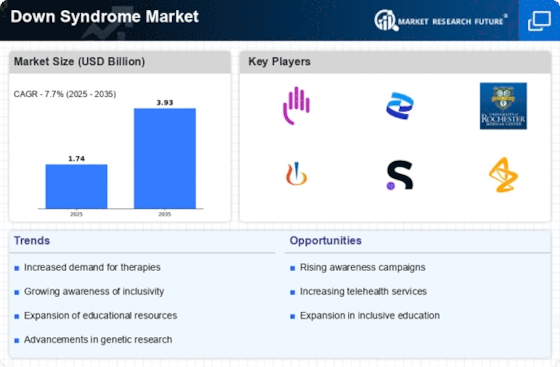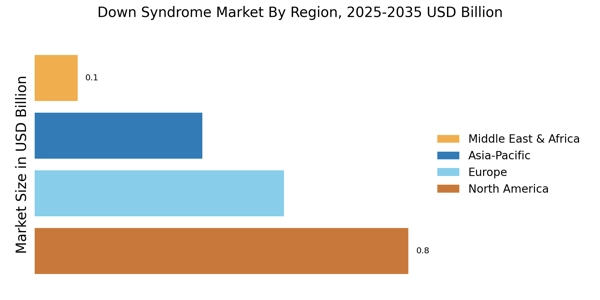Increased Research Funding
The Down Syndrome Market is experiencing a notable increase in research funding, which appears to be driven by heightened awareness of the condition. Governments and private organizations are allocating more resources to studies aimed at understanding Down syndrome and developing effective interventions. For instance, funding for genetic research and therapeutic approaches has seen a rise, potentially leading to innovative treatments. This influx of financial support may enhance the overall landscape of the Down Syndrome Market, fostering advancements in medical care and support services. As a result, stakeholders in the industry are likely to benefit from improved treatment options and increased public interest in Down syndrome research.
Advancements in Genetic Testing
The Down Syndrome Market is witnessing significant advancements in genetic testing technologies, which could revolutionize prenatal screening and diagnosis. Enhanced accuracy and accessibility of these tests may lead to earlier detection of Down syndrome, allowing for timely interventions and support. The market for genetic testing is projected to grow, with estimates suggesting a compound annual growth rate of over 10% in the coming years. This growth is likely to be fueled by increasing demand for non-invasive prenatal testing (NIPT) and the integration of advanced technologies in healthcare. Consequently, the Down Syndrome Market stands to benefit from these innovations, as they may improve outcomes for affected individuals and their families.
Rising Demand for Support Services
The Down Syndrome Market is experiencing a rising demand for support services, which appears to be influenced by a growing recognition of the needs of individuals with Down syndrome and their families. This demand encompasses a wide range of services, including educational support, therapy, and community resources. As awareness increases, families are seeking comprehensive support systems that can assist in navigating the challenges associated with Down syndrome. Market data indicates that the demand for specialized educational programs and therapeutic services is on the rise, suggesting a potential expansion of service providers within the Down Syndrome Market. This trend may lead to enhanced quality of life for individuals with Down syndrome and greater societal inclusion.
Legislative Support and Policy Changes
The Down Syndrome Market is likely to benefit from legislative support and policy changes aimed at improving the rights and opportunities for individuals with Down syndrome. Recent initiatives by governments to promote inclusivity and accessibility in education and healthcare may create a more favorable environment for individuals with Down syndrome. Policies that mandate inclusive practices in schools and workplaces could lead to increased participation and representation of individuals with Down syndrome in various sectors. This legislative momentum may stimulate growth within the Down Syndrome Market, as organizations align their services with new regulations and societal expectations, ultimately fostering a more inclusive society.
Increased Collaboration Among Stakeholders
The Down Syndrome Market is witnessing increased collaboration among various stakeholders, including healthcare providers, advocacy groups, and educational institutions. This collaborative approach appears to be driven by a shared goal of improving outcomes for individuals with Down syndrome. Partnerships between organizations can lead to the development of comprehensive programs that address the multifaceted needs of affected individuals. Market data suggests that collaborative initiatives are gaining traction, with many stakeholders recognizing the importance of a unified effort in advocacy and support. This trend may enhance the effectiveness of services offered within the Down Syndrome Market, ultimately benefiting individuals and families affected by Down syndrome.

















